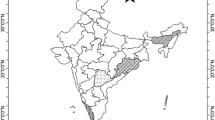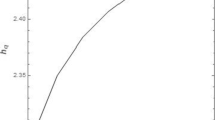Abstract
A new method of analysis namely, Singular Spectrum Analysis (SSA) is applied to the Indian Summer Monsoon (June-September) Rainfall (ISMR) series. The method is efficient in extracting the statistically significant oscillations with periods 2.8 and 2.3 year from the white noise of the ISMR series. The study shows that 2.8 / 2.3 year cycle captures the variability of the ISMR related to Southern Oscillation / Quasi Biennial Oscillation. The temporal structure of these oscillations show that these are in phase in extreme (excess and drought) monsoon conditions as well as in El Nino Southern Oscillation (ENSO) years. Both these oscillations show minimum variability during the period 1920–1940 and there is an increasing trend in the variability of these oscillations in the recent decades. The study enables to obtain pure signal consisting of reconstructed time series using these two oscillations, from the original white noise series.
Similar content being viewed by others
References
Ananthakrishnan, R. and B. Parthasarathy (1984), Indian Rainfall in relation to the sunspot cycle: 1871–12978,J. of Climate,4: 149–169.
Bhalme, H. N. and S. K. Jadhav (1984a), The double (Hale) sunspot cycle and floods and droughts in India, Weather, 39, 112–116.
Bhalme, H. N. and S. K. Jadhav (1984b), The southern oscillation and its relation to the monsoon rainfall.J. of Climate,4: 509–520.
Bhalme, H. N., S. S. Rahalkar and A.B. Sikder (1987), Tropical quasi biennial oscillation of the 10-mb wind and Indian Monsoon Rainfall-Implications for forecasting,J. of Climate:7: 345–353.
Blackman, R. B., and J. W. Tukey (1958), The measurement of power spectra, Dover Publications, 190 pp.
Climate Diagnostic Bulletin (March, 1986), Global analysis and indices NOAA / National Weather Service, N. M. C, Climate Analysis Centre, Washington D. C, 20233.
Gowariker, V., V. Thapliyal, R. P. Sarker, G. S. Mandai and D. R. Sikka (1989), Parametric and power regression models: New approach to long range forecasting of monsoon rainfall of India, Mausam, 40:115–122.
Fraedrich, K. (1986), Estimating the dimensions of weather and climate attractors,J. Atmqs. Sci.,43: 419–432.
Jagannathan, P., (1960), Seasonal forecasting in India, a review, India Meteorological Department, Special Publication, DGO, 82 / 650.
Keepene, C. L. and M. Ghil (1993), Actaptive Filtering and Prediction of the Southern Oscillation Index.J. Geophys. Res. (to be published).
Mooley, D. A. and B. Parthasarathy (1983), Indian Summer Monsoon and El Nino,PAGEOPH 121: 339–352.
Mooley, D. A. and B. Parthasarathy (1984), Fluctuations in all India Summer Monsoon Rainfall during 1871–1978. Climatic Change 287–301.
North, G. R., T. L. Bell, and R. F. Cahalan (1982), Sampling errors in the estimation of empirical orthogonal functions.Mon. Wea. Rev. 110: 699–706.
Parthasarathy, B., K. Rupakumar and D. R. Kothawale (1992), Indian Summer Monsoon rainfall indices, 1871–1990,The Met. Mag. 121: 174–186.
Pike, E. R., J. G. Mcwhirter, M. Bertero and C. de Mol (1984), Generalized information theory for inverse problems in signal processing, IEEE Proc, 131: 660–667.
Rasmusson, E. M., X. Wang and O. F. Ropelewski (1990), The biennial component of ENSO variability,J. of Marine System 1: 71–76.
Shukla, J. (1986), Monsoons, Newyork: A Wiley-Inter Science Publications, 399–464.
Vautard, R. and M. Ghil (1989), Singular spectrum analysis in nonlinear dynamics, with applications to paleoclimatic time series, Physica D,35: 395–424.
Vautard, R., P. Viou and M. Ghil (1993), Singular Spectrum Analysis: A toolkit for short, Noisy Chaotic Signals. Physica, D. (to appear).
Walker, G. T. (1910), On the Meteorological Evidence for supposed changes of climate in India,Ind. Met. Memo. 21: 1–21.
Author information
Authors and Affiliations
Additional information
The authors are thankful to Prof. R. N. Keshavamurty, Director for his constant encouragement. They wish to express their sincere thanks to Dr. A. S. R. Murty, Deputy Director for the guidance and valuable suggestions.
Rights and permissions
About this article
Cite this article
Vijayakumar, R., Kulkarni, J.R. The variability of the interannual oscillations of the indian summer monsoon rainfall. Adv. Atmos. Sci. 12, 95–102 (1995). https://doi.org/10.1007/BF02661291
Received:
Revised:
Issue Date:
DOI: https://doi.org/10.1007/BF02661291




